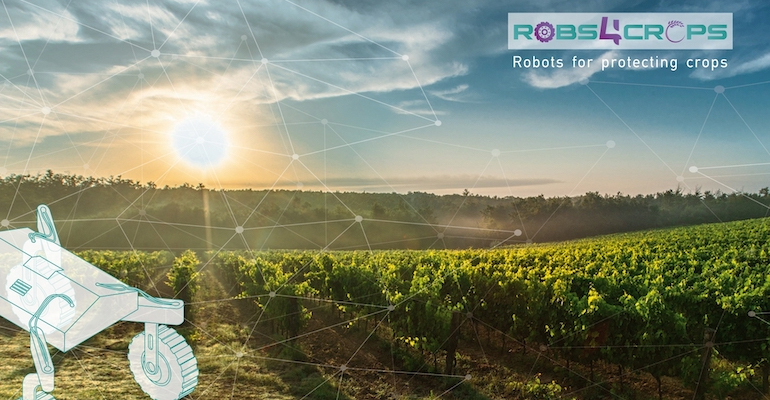News
Eight million Euro project aims to bring robotic farming to Europe
2 Apr 2021In the face of continued labor shortages on farms throughout the EU, robots have ratcheted their way up in terms of importance for farmers, but these automatic, mechanical solutions have not yet become a mainstream solution to replace this shortage. To help speed up the adoption of robots in the agriculture sector, the EU government invested €7.9 million Euros into Robs4Crops, a project that hopes to bring productivity, efficiency and environmental sustainability to farms.
The focus of this project is replacing the hard-to-find farm labor that has become even more difficult to secure amid the pandemic that has stymied the flow of seasonal farmhands across borders. This lack of help has led to difficulties in planting and harvesting, which has reached such a degree that farmers have had to leave their produce to rot in the fields or have been unable to sew a sufficient number of crops for a successful harvest.

Robots, according to Robs4Crops offer an alternative to human labor to allow for a safe and cost-effective approach to tasks that are normally mundane and routine. To prove this claim, this project is testing out fully autonomous farming systems in the Netherlands, France, Spain and Greece.
The test systems will include three elements: smart implements, which are sprayer implements that detect and spot target weeds; autonomous vehicles that sense the environment and navigate using the smart elements; and the farming controller, which is planning and scheduling software that uses Digital Twin technology. In a price-sensitive move, existing agricultural machinery that is already on test sites will simply be upgraded to function in conjunction with the agricultural robots.
As the project focuses on repetitive and demanding operations in the fields, it is not only eliminating the need for farmers to engage in these routine tasks, but it brings an element of environmental friendliness to the equation. Due to the ability of smart implement to target and spray individual weeds, this autonomous farming equipment reduces the need to plow and thereby lowers the diesel emissions from tractors continually tilling soils. It also decreases the amount of weed spray needed on fields and does not blanket spray and damage plants and micro-organisms in the soil.
Robs4Crops is not the only initiative working to introduce artificial intelligence and robotics into the agriculture sector. Facebook’s See & Spray robots employ a high-resolution camera that has been fed with thousands of images of weeds and crops in order to help the AI establish a difference between the two types of greenery.
Related news

Oat Barista: Innovation for game-changing beverages
20 Nov 2025
Oat Barista is a clean label, sustainable, and innovative drink base specifically designed to create the perfect foam in one single ingredient.
Read more
Nitrites: Pressure grows on UK to follow EU’s lead
20 Nov 2025
Pressure is growing on the UK to follow the EU’s lead after the bloc revised its regulations on the permitted levels of nitrites and nitrates in cured meats.
Read more
Empowering innovation in fortification and colouration
13 Nov 2025
Divi’s Nutraceuticals offers a large portfolio of innovative, high-quality ingredients for foods, beverages, and supplements, with bespoke solutions and expert support for product success.
Read more
Danone highlights digestive health as potential ‘tipping point’ for food industry
13 Nov 2025
Danone is betting on a food industry “tipping point” that will bloat the market for healthy products, particularly those related to gut health.
Read more
Standing Ovation and Bel scale up casein production from dairy co-products
11 Nov 2025
Foodtech company Standing Ovation has partnered with cheese specialist Bel Group to manufacture dairy serums for industrial-scale casein production via precision fermentation.
Read more
AI attraction means foodtech startups must ‘prove’ rather than ‘promise’
4 Nov 2025
Reports suggest that artificial intelligence (AI) is sucking investment from foodtech and agritech, but investors say the picture is complicated.
Read more
Will postbiotics become the go-to functional ingredient?
3 Nov 2025
Postbiotics show significant promise for the functional foods market due to their safety profile and beneficial bioactive properties, research suggests.
Read more
Meet the finalists of the Fi Europe Innovation Awards 2025
31 Oct 2025
Who made it to the shortlist of the Fi Europe Innovation Awards 2025? Read about the 23 companies making food and drink products healthier and manufacturing processes more efficient.
Read more
Penguin and Club bars no longer classed as chocolate
30 Oct 2025
Penguin and Club bars can no longer be classified as chocolate after the pladis-owned McVitie’s brands turned to cheaper alternatives amid the ongoing cocoa crisis.
Read more
Shorter drying time, sweeter success!
30 Oct 2025
Curious about cost-effective, sustainable and delicious candy making? Stefan Wessel reveals how Avebe’s solutions reduce drying time and energy use by up to 50%.
Read more